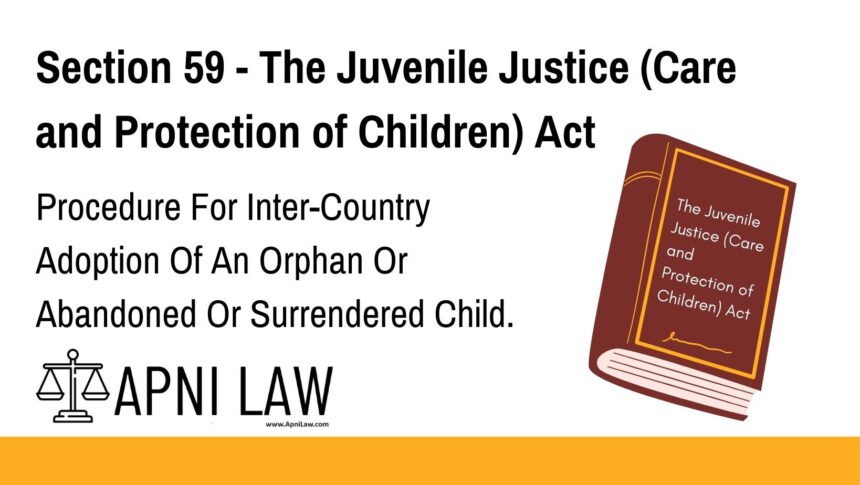Code: Section 59
Section 59: Procedure for Inter-Country Adoption of an Orphan or Abandoned or Surrendered Child
(1) If an orphan, abandoned, or surrendered child cannot be placed with an Indian or non-resident Indian adoptive parent within sixty days of being declared legally free for adoption, the child will be considered eligible for inter-country adoption.
However, children with physical or mental disabilities, siblings, or those over five years old will be given preference for inter-country adoption in line with the adoption regulations set by the Authority.
(2) Non-resident Indians, overseas citizens of India, and people of Indian origin will be given priority in adopting Indian children.
(3) Non-resident Indians, overseas citizens of India, or people of Indian origin, or even foreigners, who want to adopt a child from India, may apply through an authorised foreign adoption agency, a Central Authority, or the relevant government department in their home country.
(4) The authorised agency will assess the prospective adoptive parents. Once they are deemed suitable, their application will be forwarded to the Authority for adoption.
(5) Upon receiving the application, the Authority will examine it. If suitable, the Authority will refer the parents to a Specialised Adoption Agency where children available for adoption are matched.
(6) The Specialised Adoption Agency will match the child with the parents and provide the child’s study and medical report. The parents will review the reports, sign them, and return them to the agency.
(7) Once the parents accept the child, the Specialised Adoption Agency will apply to the District Magistrate for an adoption order.
(8) Once the adoption order is issued, the agency will send a certified copy to the Authority, State Agency, and the prospective adoptive parents. The agency will also apply for a passport for the child.
(9) The Authority will notify both the Indian immigration authorities and the receiving country’s authorities about the adoption.
(10) The prospective parents will receive the child from the Specialised Adoption Agency once the passport and visa are issued.
(11) The authorised foreign agency or Central Authority will track the child’s progress within the adoptive family and ensure proper arrangements are made if any issues arise.
(12) Foreigners or people of Indian origin who reside in India and wish to adopt a child from India may apply to the Authority. They will also need a no-objection certificate from their country’s diplomatic mission in India.
Explanation of Section 59
Section 59 outlines the process for inter-country adoption of children in India. It provides a clear procedure for matching children with adoptive parents living abroad, prioritizing non-resident Indians and people of Indian origin. The process includes home study reports, matching children, and obtaining adoption orders from the District Magistrate. The section ensures that children are placed with suitable parents while maintaining ethical standards and regulations.
Illustration
Example 1: Inter-Country Adoption Process
After 60 days, no suitable Indian or non-resident Indian adoptive parents have been found for an orphaned child. The child becomes eligible for inter-country adoption. The Specialised Adoption Agency matches the child with a foreign couple who is willing to adopt. They complete all necessary steps, including receiving the adoption order and obtaining a passport for the child.
Example 2: Foreign Applicants for Adoption
A couple from Canada applies to adopt a child from India. The authorised foreign adoption agency prepares a home study report, and after approval, their application is forwarded to the Indian Authority. The Authority matches them with a child, and the legal process for adoption begins.
Common Questions and Answers on Section 59
1. How does a child become eligible for inter-country adoption?
- Answer: If a child is not placed with an Indian or non-resident Indian parent within 60 days, the child can be considered for inter-country adoption.
2. What role does the Specialised Adoption Agency play?
- Answer: The agency matches children with adoptive parents, handles child reports, and submits the adoption request to the District Magistrate.
3. Who gets priority in inter-country adoption?
- Answer: Non-resident Indians, overseas citizens of India, and people of Indian origin receive priority in adopting Indian children.
Conclusion
Section 59 ensures that children who are legally free for adoption are placed with suitable adoptive parents abroad. It prioritizes Indian citizens living abroad, and foreign applicants go through a clear and regulated process. This section aims to protect the child’s best interests while ensuring a safe adoption process.









